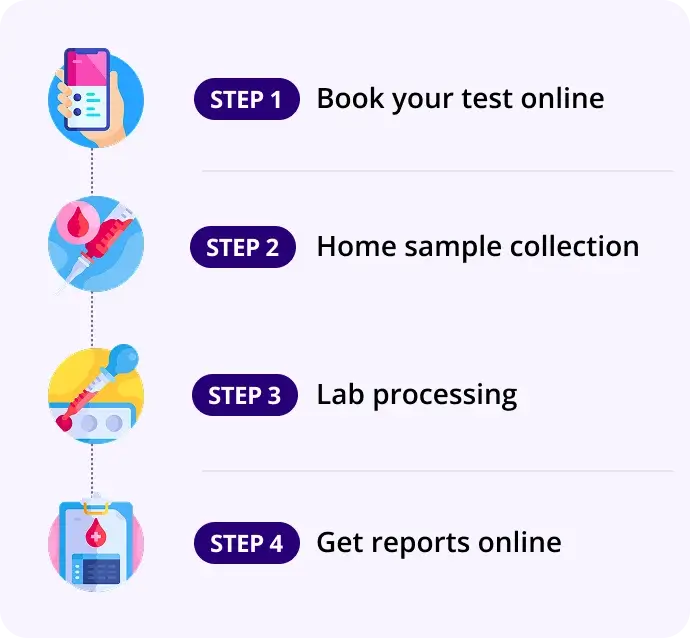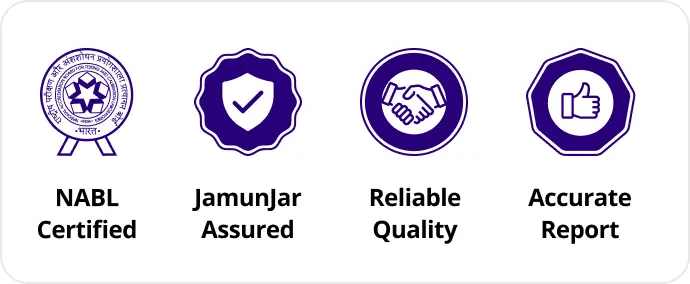Search for
Hepatitis B Surface Antigen (HBsAg) (Quantitative)
Liver
Report in 4Hrs
At Home
No Fasting Required
Details
It indicates high levels of viral replication and infectivity in individuals with chronic or acute hepatitis B
₹199₹495
60% OFF
FREE:
Ai Insights
Hepatitis B Surface Antigen (HBsAg) (Quantitative) - Comprehensive Medical Test Guide
- Why is it done?
- Test Purpose: This test measures the quantity of Hepatitis B surface antigen (HBsAg) in the blood. HBsAg is a protein found on the surface of hepatitis B virus (HBV) particles. Its presence indicates active hepatitis B infection, either acute or chronic.
- Initial Screening: Screening individuals with risk factors for hepatitis B infection, including healthcare workers, patients with multiple sexual partners, intravenous drug users, household contacts of HBsAg-positive individuals, and pregnant women.
- Diagnostic Confirmation: Confirming hepatitis B infection in patients with clinical symptoms such as jaundice, abdominal pain, fatigue, nausea, and elevated liver enzymes.
- Chronic Infection Monitoring: Monitoring viral load in patients with known chronic hepatitis B to assess disease progression and treatment response. Quantitative HBsAg levels help predict disease activity and prognosis.
- Pre-treatment Assessment: Establishing baseline HBsAg levels before initiating antiviral therapy to help guide treatment decisions and predict treatment outcomes.
- Treatment Response Monitoring: Assessing efficacy of antiviral therapy by tracking changes in HBsAg levels during treatment. Declining HBsAg indicates positive treatment response.
- Post-Exposure Prophylaxis Follow-up: Testing individuals who have received hepatitis B vaccine or immunoglobulin after potential exposure to determine if infection has occurred.
- Blood and Organ Donor Screening: Routine screening of blood, plasma, organ, and tissue donors to prevent transmission of hepatitis B through transfusion or transplantation.
- Normal Range
- Negative Result: Less than 0.05 IU/mL (International Units per milliliter) or negative/non-detectable. This indicates no evidence of current hepatitis B infection.
- Positive/Detectable Result: Greater than or equal to 0.05 IU/mL indicates the presence of hepatitis B surface antigen and active HBV infection.
- Units of Measurement: IU/mL (International Units per milliliter). Some laboratories may also report results in ng/mL (nanograms per milliliter) with conversion standards available.
- Interpretation of Normal vs Abnormal: Normal (negative) result suggests the individual is not currently infected with hepatitis B virus. Abnormal (positive) result confirms active HBV infection, whether acute or chronic, and indicates the patient is potentially infectious.
- Clinical Cutoff Values: Reference ranges may vary slightly between laboratories. Most use a cutoff of 0.05 IU/mL as the detection limit. Values below this are considered negative; values at or above are considered positive.
- Interpretation
- HBsAg Negative (<0.05 IU/mL): No evidence of current hepatitis B infection. Individual is either never infected, recovered from infection with cleared virus, or successfully vaccinated. However, this does not exclude recent infection (window period) or infection with hepatitis B mutant strains.
- HBsAg Positive (≥0.05 IU/mL): Confirms active hepatitis B infection. Patient is infectious and can transmit HBV to others. Requires further evaluation with additional serological markers (HBsAb, HBcAb, HBeAg, HBeAb, HBV DNA) to differentiate between acute and chronic infection and assess disease activity.
- Low Level HBsAg (0.05-2 IU/mL): Indicates active infection but with low viral replication. May be seen in resolved infection with residual antigen, chronic infection with low HBV DNA levels, or during treatment response. Requires clinical correlation and additional testing.
- High Level HBsAg (>100 IU/mL): Indicates high viral replication and active hepatitis B disease. Associated with higher infectivity and greater risk of transmission. Suggests acute infection or chronic infection with active disease. More likely to require antiviral therapy.
- Declining HBsAg Trend: In patients undergoing treatment, decreasing HBsAg levels indicate positive treatment response. HBsAg negativization (clearance) is a major treatment goal and indicates viral suppression.
- Flare Patterns: Sudden increases in HBsAg levels may indicate disease flares or viral reactivation. Can occur during treatment interruption or in patients with natural disease progression.
- Factors Affecting Results: HBV mutant strains may result in falsely negative HBsAg despite HBV DNA presence; HBsAb co-positivity may lower HBsAg detection; laboratory methodology variations; specimen handling and storage; time since infection; immune status of patient.
- Clinical Significance: Quantitative HBsAg is highly specific for hepatitis B infection and correlates with HBV DNA levels, making it valuable for prognostic assessment and treatment planning. It is the first marker to appear in acute infection and persists in chronic infection.
- Associated Organs
- Primary Organ System: Liver - Hepatitis B virus directly infects and replicates in hepatocytes (liver cells), causing inflammation and hepatocyte death, resulting in liver disease.
- Acute Hepatitis B: Characterized by acute liver inflammation with jaundice, hepatomegaly, elevated liver enzymes (ALT, AST), and coagulopathy. Most adults clear the infection, but a small percentage develop fulminant hepatic failure requiring transplantation.
- Chronic Hepatitis B: Persistent infection lasting more than 6 months characterized by ongoing hepatic inflammation, progressive fibrosis, and potential cirrhosis development. Approximately 90% of infected infants and 30% of infected children develop chronic infection.
- Hepatic Cirrhosis: Chronic HBV infection progresses to cirrhosis in 15-30% of patients, characterized by extensive hepatic fibrosis, loss of liver function, portal hypertension, and development of varices. This is the most serious consequence of chronic hepatitis B.
- Hepatocellular Carcinoma (HCC): Chronic HBV infection significantly increases risk of developing primary liver cancer. HCC can develop both in cirrhotic and non-cirrhotic livers with chronic HBV. High HBsAg levels are associated with increased HCC risk.
- Extrahepatic Manifestations: Hepatitis B can cause immune-mediated extrahepatic diseases including glomerulonephritis, vasculitis, arthritis, and cryoglobulinemia through immune complex deposition in various organs.
- Associated Medical Conditions: Patients with chronic HBV have increased risk of hepatitis D superinfection (HDV), which accelerates disease progression; increased susceptibility to hepatitis C co-infection; higher rates of alcohol-related liver disease complications; increased risk of tuberculosis reactivation; and potential for immune reconstitution inflammatory syndrome (IRIS) in HIV-coinfected patients.
- Potential Complications: Fulminant hepatic failure with hepatic encephalopathy; varices with life-threatening bleeding; ascites and spontaneous bacterial peritonitis; liver transplantation requirement; vertically transmitted infection in newborns; and significant psychosocial burden related to chronic disease diagnosis.
- Follow-up Tests
- Hepatitis B Core Antibody (HBcAb/Anti-HBc): Indicates past or current HBV infection; helps differentiate between acute infection (IgM anti-HBc positive) and chronic infection (IgG anti-HBc positive). Essential for confirming HBsAg-positive results.
- Hepatitis B Surface Antibody (HBsAb/Anti-HBs): Indicates immunity to hepatitis B from vaccination or recovery from infection. If HBsAg is positive, HBsAb is typically negative (mutually exclusive). Presence together may indicate early clearance or unusual HBV variant.
- Hepatitis B e Antigen (HBeAg) and Hepatitis B e Antibody (HBeAb): HBeAg presence indicates high viral replication and infectivity. HBeAg positivity correlates with higher HBV DNA levels. HBeAb positivity may indicate lower infectivity but does not exclude active infection. Essential for assessing disease activity.
- Hepatitis B Virus DNA (HBV DNA) - Quantitative PCR: Most sensitive and specific marker of HBV replication. Measured in copies/mL or IU/mL. Essential for diagnosis confirmation, prognosis assessment, and treatment decisions. Serial monitoring assesses treatment efficacy.
- Liver Function Tests (LFTs): Alanine aminotransferase (ALT) and aspartate aminotransferase (AST) indicate hepatocyte injury; alkaline phosphatase and bilirubin reflect cholestasis; albumin and prothrombin time assess synthetic liver function. Help determine disease severity and need for treatment.
- Hepatitis B Genotyping: Identifies HBV genotype (A-H), which influences disease progression and treatment response. Some genotypes have better treatment outcomes. Useful in patients with particular geographic origins or treatment failures.
- Viral Resistance Testing: Detects antiviral drug resistance mutations in patients with treatment failure or suboptimal response. Guides selection of alternative or additional antiviral agents.
- Liver Biopsy and Fibrosis Assessment: Histology assesses degree of inflammation, fibrosis stage, and cirrhosis presence. Liver elastography (FibroScan) non-invasively measures liver stiffness as surrogate for fibrosis. Important for prognosis and treatment decisions.
- Complete Blood Count (CBC): Assesses for cytopenias (anemia, thrombocytopenia, leukopenia) which suggest advanced liver disease or portal hypertension. Platelet count is marker of hepatic synthetic function.
- Abdominal Ultrasound or CT/MRI: Evaluates liver parenchymal echotexture, assesses for cirrhosis features, detects hepatic lesions suspicious for HCC, evaluates portal vein patency, and assesses for ascites and splenomegaly.
- Alpha-Fetoprotein (AFP): Marker for hepatocellular carcinoma surveillance in cirrhotic patients or those with advanced chronic HBV. Elevated levels warrant imaging evaluation.
- HIV and Hepatitis C Testing: Recommended for all HBsAg-positive patients to screen for co-infections, which significantly impact prognosis and treatment strategies.
- Monitoring Schedule: Chronic HBV patients should have HBsAg, HBV DNA, liver function tests monitored every 3-6 months when not on treatment; more frequently during treatment; every 6-12 months in inactive carriers; and surveillance imaging for HCC every 6 months in cirrhotic patients.
- Fasting Required?
- Fasting Requirement: NO - Fasting is not required for the quantitative HBsAg test. Blood can be drawn at any time of day regardless of food or fluid intake.
- Special Instructions: No special dietary restrictions or fasting periods are necessary. Patient may eat and drink normally before the test.
- Medication Continuation: All routine medications should be taken as normally scheduled. HBsAg test results are not affected by medication use, including antiviral medications, which should continue uninterrupted unless otherwise directed by physician.
- Sample Collection Requirements: A single venipuncture blood draw is required. Approximately 5-10 mL of blood is collected in a gold-top serum separator tube or equivalent. No special handling of the collection tube is necessary beyond standard protocols.
- Pre-test Preparation: Patient should be adequately hydrated to facilitate blood draw. Bring insurance card and photo identification. Inform phlebotomist of any bleeding disorders or medications affecting coagulation (warfarin, aspirin) to prevent excessive bruising.
- Timing Considerations: For serial monitoring, tests should be drawn at consistent times when possible, preferably in morning hours, to reduce variability from circadian rhythm effects on some viral markers. However, this is not critical for HBsAg measurement.
- Post-test Activity: No restrictions on activity after blood draw. Patients may resume normal activities immediately. Light pressure applied to venipuncture site for a few minutes helps prevent hematoma formation.
- Results Timeline: Results are typically available within 24-48 hours depending on the laboratory. Some facilities with rapid testing may provide results within a few hours. Results are reported to ordering physician and communicated to patient per standard protocols.
How our test process works!

